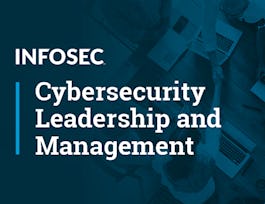This course focuses on the critical aspects of communicating cyber risk to stakeholders and establishing effective governance structures. Executives will learn to translate technical cyber risk concepts into business language, report to the board, and build a cyber risk-aware culture. The course also covers regulatory compliance, the role of cyber insurance, and techniques for resolving disputes and building consensus within the organization.



Executive Communication and Governance
This course is part of Cyber Risk Management for Executives Specialization


Instructors: FAIR Institute
Sponsored by Syrian Youth Assembly
Details to know

Add to your LinkedIn profile
21 assignments
September 2024
See how employees at top companies are mastering in-demand skills

Build your subject-matter expertise
- Learn new concepts from industry experts
- Gain a foundational understanding of a subject or tool
- Develop job-relevant skills with hands-on projects
- Earn a shareable career certificate


Earn a career certificate
Add this credential to your LinkedIn profile, resume, or CV
Share it on social media and in your performance review

There are 3 modules in this course
This module is designed to equip participants with the skills to understand and communicate cyber risk in business terms using the FAIR (Factor Analysis of Information Risk) framework. It highlights the importance of presenting cyber risks in ways that resonate with business executives and stakeholders. Participants will explore how to translate technical risks into actionable business insights, prioritize security measures, and foster effective communication across the organization to support informed decision-making and risk management.
What's included
7 videos6 readings7 assignments1 peer review6 discussion prompts
This module focuses on the significance of effective communication in cyber risk management, particularly through the FAIR (Factor Analysis of Information Risk) framework. Participants will learn to communicate cyber risks to executives and board members effectively, align risk management efforts with business goals, and break down silos between security and business teams. The module covers the importance of framing cyber risk in business terms, best practices for board reporting, and strategies for achieving executive alignment in risk management.
What's included
8 videos6 readings9 assignments2 peer reviews7 discussion prompts
This module focuses on the governance of cyber risk at the executive level and the role of the FAIR (Factor Analysis of Information Risk) framework in setting global benchmarks for regulatory compliance. Participants will explore the gaps in cyber risk posture among C-suite executives, understand the principles of board governance, and examine the influence of new regulations on cybersecurity risk management. The module emphasizes the importance of standardizing cyber risk reporting and how the FAIR framework informs regulatory readiness and compliance.
What's included
4 videos7 readings5 assignments6 discussion prompts
Offered by
Why people choose Coursera for their career




Recommended if you're interested in Business

FAIR Institute

Coursera Instructor Network

Infosec

Open new doors with Coursera Plus
Unlimited access to 10,000+ world-class courses, hands-on projects, and job-ready certificate programs - all included in your subscription
Advance your career with an online degree
Earn a degree from world-class universities - 100% online
Join over 3,400 global companies that choose Coursera for Business
Upskill your employees to excel in the digital economy



